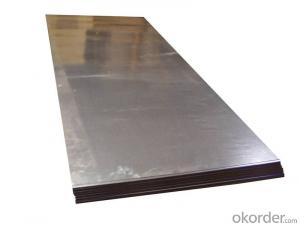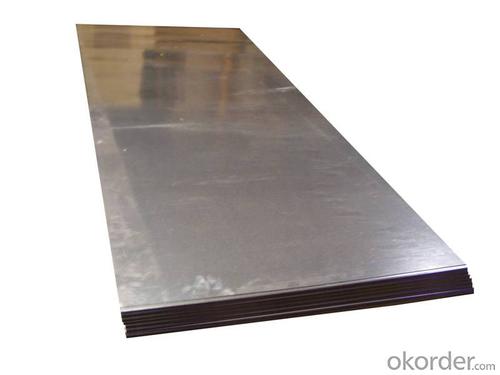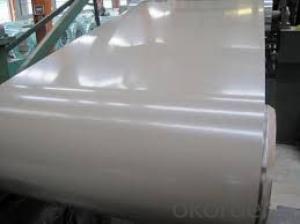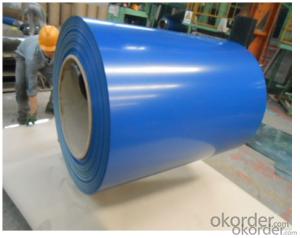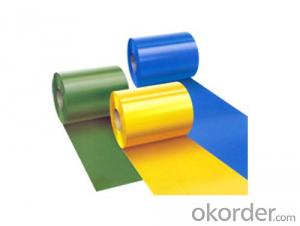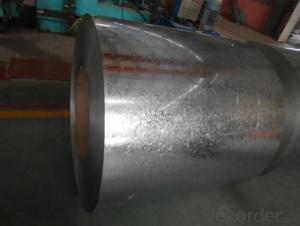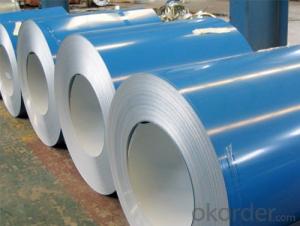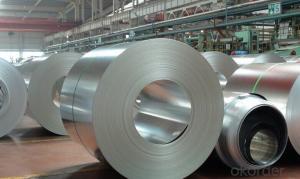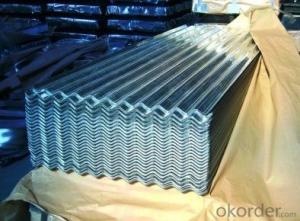Galvanized Steel Plain Sheet with First Class Quality and Best Price
- Loading Port:
- Shanghai
- Payment Terms:
- TT OR LC
- Min Order Qty:
- 50 m.t.
- Supply Capability:
- 5000 m.t./month
OKorder Service Pledge
OKorder Financial Service
You Might Also Like
1.Hot-Dip Galvanized Steel Plain Sheet Description:
Hot-dip galvanized steel coils are available with a pure zinc coating through the hot-dip galvanizing process. It offers the economy, strength and formability of steel combined with the corrosion resistance of zinc. The hot-dip process is the process by which steel gets coated in layers of zinc to protect against rust. It is especially useful for countless outdoor and industrial applications. Production of cold formed corrugated sheets and profiles for roofing, cladding, decking, tiles, sandwich walls, rainwater protective systems, air conditioning duct as well as electrical appliances and engineering.
2.Main Features of the Hot-Dip Galvanized Steel Plain Sheet :
• Excellent process capability
• Smooth and flat surface
• Workability, durability
• Excellent anticorrosive property
• High strength
• Good formability
• Good visual effect
3. Hot-Dip Galvanized Steel Plain Sheet Images
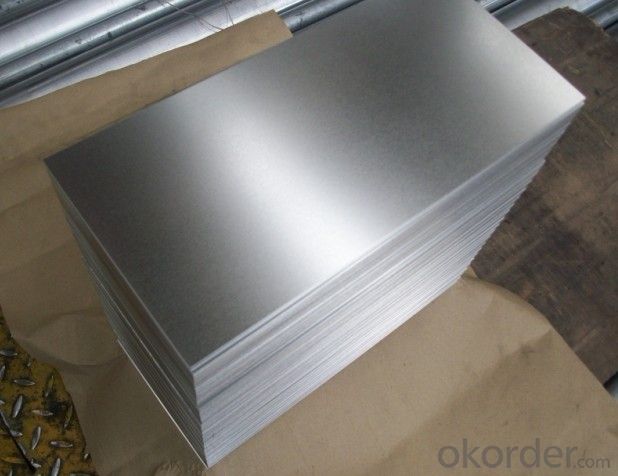
4.Hot-Dip Galvanized Steel Sheet Specification
Standard: ASTM, JIS,EN
Grade: CS, DX51D+Z,SGCC, SS 230~550,S220GD+Z~S550GD+Z, SGC340~SGC570
Thickness: 0.1mm~5mm
Width: max 2000mm
Coil weight:3-12 MT
Coil ID:508/610mm
Surface structure: zero spangle, regular spangle or minimum spangle
Surface treatment: Chromate treatment, Oiled/dry, skinpassed/non-skinpassed
Packing: Standard seaworthy export package
Technology test results:
Processability | Yield strength | Tensile strength | Elongation % | 180°cold-bending |
Common PV | - | 270-500 | - | d=0,intact,no zinc removal |
Mechanical interlocking JY | - | 270-500 | - | d=0,intact,no zinc removal |
Structure JG | >=240 | >=370 | >=18 | d=0,intact,no zinc removal |
Deep drawn SC | - | 270-380 | >=30 | d=0,intact,no zinc removal |
EDDQ SC | - | 270-380 | >=30 | d=0,intact,no zinc removal |
5.FAQ of Hot-Dip Galvanized Steel Sheet
We have organized several common questions for our clients,may help you sincerely:
1.How about your company?
A world class manufacturer & supplier of castings forging in carbon steel and alloy steel,is one of the large-scale professional investment casting production bases in China,consisting of both casting foundry forging and machining factory. Annually more than 8000 tons Precision casting and forging parts are exported to markets in Europe,America and Japan. OEM casting and forging service available according to customer’s requirements.
2.How to guarantee the quality of the products?
We have established the international advanced quality management system,every link from raw material to final product we have strict quality test;We resolutely put an end to unqualified products flowing into the market. At the same time, we will provide necessary follow-up service assurance.
3. How long can we receive the product after purchase?
Usually within thirty working days after receiving buyer’s advance payment or LC. We will arrange the factory manufacturing as soon as possible. The cargo readiness usually takes 15-30 days, but the shipment will depend on the vessel situation.
- Q: I have never owned a non-stainless steel chef's knife and have been looking at some to buy recently, but all of them have various degrees of wear and use. They say that the wear is normal for non-stainless steel knives, but how can I tell if it is too much wear, or if the blade is clean?
- cold rolled steel waers as you carve meat. If the blad if to thin you may want a better one. Utica knife in utica N.Y. made them up to about 10 years ago and i still buy them at auctions.
- Q: What are the common coil weights available for steel coils?
- The available coil weights for steel coils vary depending on the specific application and industry requirements. However, the market offers a few standard coil weights. 1. Light coils: Industries such as automotive, construction, and appliance manufacturing prefer light coils weighing between 3 to 6 metric tons (6,000 to 13,000 pounds). These smaller and more manageable coil sizes are commonly used. 2. Medium coils: Industries like construction, infrastructure, and general manufacturing utilize medium coils weighing between 6 to 15 metric tons (13,000 to 33,000 pounds). 3. Heavy coils: Heavy industries such as shipbuilding, heavy machinery manufacturing, and infrastructure projects require heavy coils weighing over 15 metric tons (33,000 pounds), with some reaching 30 metric tons (66,000 pounds) or more. These coils provide the necessary strength for large steel components. It's important to understand that these weight ranges are flexible and subject to customer or industry specifications. Some manufacturers may even offer customized coil weights to meet specific project requirements. To determine the most suitable coil weight for a particular application, it is advised to consult with a steel supplier or manufacturer.
- Q: like building steel beams. i'm pretty sure with a sawzall.
- Most I-beams are manufactured in a factory by rolling the red hot steel billet through several sets of rolls till the I-beam takes it's final shape. All we normally do to a factory stock I-beam is cut it to length, trim the ends, punch out the mounting holes and or weld on shear tabs. Some I-beams like tapered ones are built from scratch in the shop using plate steel. In fabricating in the shop, a plasma cutter or cutting torch is used along with a hydraulic plate shear. Repairs during erection, usually a cutting torch because you are several stories in the air. If the beam has to be taken to the ground, still a cutting torch because on a job site power availability is poor to connect a plasma cutter. Wingman
- Q: Can steel coils be coated with color-changing materials?
- Yes, steel coils can be coated with color-changing materials. These materials are typically applied as a topcoat or overcoat on the steel surface, allowing the coils to exhibit different colors or hues based on external factors such as temperature, light, or chemical reactions. This coating technology can provide visual appeal, aesthetic versatility, and even functional benefits to steel coils in various applications.
- Q: hello guys. im totally new to this metalwork things. i need to do it for my project. i need to join stainless steel wires to build some kind of structure (eiffel tow. for example).i already have the wire and the torch. now the question is: where do i get silver solder? is it expensive? and what is flux for? is it necessary? what does it do? is it expensive?thank u for ur time guys! :)
- the flux you need is powdered borax
- Q: What are the common coil widths and thickness combinations available for steel coils?
- The steel coils available in the market come in various combinations of coil widths and thicknesses, depending on the specific requirements and industry standards. While there are some standard sizes commonly found, there is also the option for custom widths to cater to specific project needs. In terms of coil widths, the market offers a range of standard sizes, with the most common ones falling between 600mm and 2000mm. These widths find extensive use in industries like automotive, construction, and manufacturing. Nevertheless, it is possible to obtain custom widths tailored to the requirements of a particular project. Regarding thickness combinations, steel coils are typically available in a variety of thicknesses. The most widely used thicknesses for steel coils fall within the range of 0.4mm to 3mm. However, it is also possible to obtain thicker or thinner options depending on the specific application. It is important to bear in mind that these standard sizes and thickness combinations may vary depending on factors such as the specific steel grade, manufacturing process, and the capabilities of the supplier. To ensure the availability of the desired coil widths and thickness combinations, it is always advisable to discuss the required specifications with the supplier or manufacturer.
- Q: How are steel coils inspected for bendability using bend testers?
- Bend testers are specialized machines utilized to inspect the bendability of steel coils, measuring their flexibility and resistance against bending. The inspection process involves multiple steps to guarantee precise and dependable outcomes. To begin with, the steel coil is prepared by securing it firmly in place, typically using clamps or other mechanisms to prevent any movement during testing. This ensures stability and enables consistent and repeatable measurements. Following that, the bend tester is set up according to the specified testing parameters. These parameters usually include the desired bend angle, the speed at which the bend is applied, and the number of cycles to be performed. The bend tester is equipped with a bending mechanism that applies a controlled force on the coil, simulating the bending conditions it may experience in its application or use. Once the bend tester is ready, the bending process commences. The machine gradually applies an increasing force to the steel coil until it reaches the desired bend angle. Careful measurement and monitoring of this force take place throughout the process to ensure accuracy. While the bending process is underway, the machine records and displays significant data, such as the applied force, the angle of bend, and any indications of cracking or other defects. This data is crucial for evaluating the bendability of the steel coil and determining its compliance with required standards. Once the desired bend angle is attained, the coil is released from the bending mechanism, allowing any residual stresses to relax. This relaxation period is essential for observing any potential spring-back effect, where the coil partially returns to its original shape after bending. The amount of spring-back is also measured and recorded for further analysis. Finally, the inspection results are analyzed to assess the overall bendability of the steel coil. If the coil meets the specified bendability criteria, it can be deemed acceptable for its intended application. However, if any cracks, fractures, or excessive spring-back are detected, further investigation and analysis may be necessary to identify the cause and determine appropriate corrective actions. In conclusion, bend testers play a crucial role in inspecting the bendability of steel coils. Through a controlled and systematic process, these machines accurately measure flexibility and resistance to bending, ensuring the quality and reliability of steel coils used in various industries.
- Q: How are steel coils inspected for surface finish after processing?
- Steel coils are typically inspected for surface finish after processing using visual and tactile methods. Trained inspectors visually examine the coils for any imperfections, such as scratches, dents, or uneven coating. They also run their fingers over the surface to detect any irregularities. Additionally, advanced technologies like digital imaging systems and laser scanners are employed to provide accurate and detailed analysis of the surface finish.
- Q: What's the best way to clean granite countertops and stainless steel appliances? My countertops especially always look dull and streaky. Thanks!!!!!!!
- The best home remedy for that is shaving cream. Use men's shaving cream, not the gel, and not the ones with aloe, but regular shaving cream. It'll get the crud off and it'll shine it up for you. Just make sure you wipe it down really well, so there aren't any streaks.
- Q: I mean about if I had a piece of metal, how can i decide that's iron or steel?Sorry for bad English.
- Iron is a chemical element with the symbol Fe, that has no engineering application as it is very soft. You are not likely to come across a piece of metal of pure Iron. Steel is an alloy of Iron that is widely used with different types for various application. The type depends on the alloying elements. An old and rough way of identifying them is to use a chart, that shows the spark pattern when they are subjected to grinding.
Send your message to us
Galvanized Steel Plain Sheet with First Class Quality and Best Price
- Loading Port:
- Shanghai
- Payment Terms:
- TT OR LC
- Min Order Qty:
- 50 m.t.
- Supply Capability:
- 5000 m.t./month
OKorder Service Pledge
OKorder Financial Service
Similar products
Hot products
Hot Searches
Related keywords
